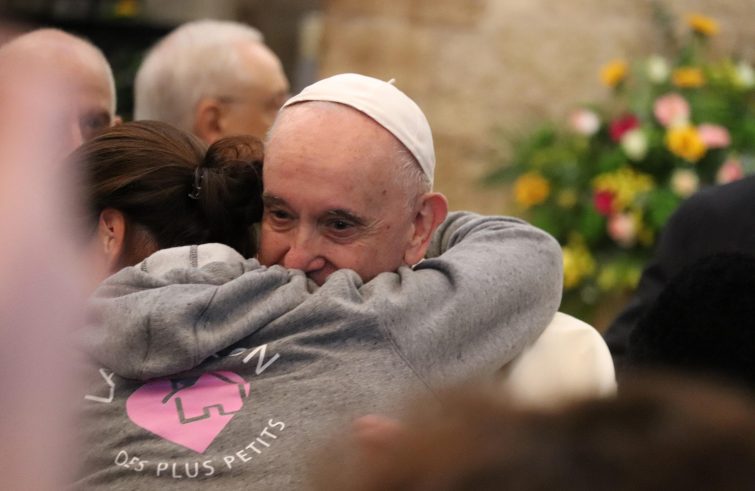
“A sound provocation to help us reflect on our way of living and the many poverties of our present time.” In the Message released today, Francis thus describes the Sixth World Day of the Poor, due to be celebrated November 13 next with the theme For your sakes Christ became poor (cf. 2 Cor 8:9). “Several months ago, the world was emerging from the tempest of the pandemic, showing signs of an economic recovery that could benefit millions of people reduced to poverty by the loss of their jobs”, Francis recalls that “a patch of blue sky was opening that, without detracting from our sorrow at the loss of our dear ones, promised to bring us back to direct interpersonal relations and to socializing with one another once more without further prohibitions or restrictions.”
“Now, however, a new catastrophe has appeared on the horizon, destined to impose on our world a very different scenario” – Francis said referring to the war in Ukraine, which “has now been added to the regional wars that for years have taken a heavy toll of death and destruction.” “Yet here the situation is even more complex due to the direct intervention of a ‘superpower’ aimed at imposing its own will in violation of the principle of the self-determination of peoples”, the Pope denounces: “Tragic scenarios are being re-enacted and once more reciprocal extortionate demands made by a few potentates are stifling the voice of a humanity that cries out for peace.”
“Millions of women, children and elderly people are being forced to brave the danger of bombs just to find safety by seeking refuge as displaced persons in neighbouring countries”, Francis writes:
“What great poverty is produced by the senselessness of war! Wherever we look, we can see how violence strikes those who are defenseless and vulnerable. We think of the deportation of thousands of persons, above all young boys and girls, in order to sever their roots and impose on them another identity.”
“How many others remain in the war zones, living each day with fear and the lack of food, water, medical care and above all human affections?”, reads the text: “In these situations, reason is darkened and those who feel its effects are the countless ordinary people who end up being added to the already great numbers of those in need.” To that regard, the Pope commends the generosity that in recent years has led “entire populations to open their doors to welcome millions of refugees from wars in the Middle East, Central Africa and now Ukraine.” “Families have opened their homes to make room for other families, and communities have generously accepted many women and children in order to enable them to live with the dignity that is their due”, Francis notes. However,
“the longer conflicts last, the more burdensome their consequences become.
The peoples who offer welcome find it increasingly difficult to maintain their relief efforts; families and communities begin to feel burdened by a situation that continues past the emergency stage.” “This is the moment for us not to lose heart but to renew our initial motivation”, the appeal: “The work we have begun needs to be brought to completion with the same sense of responsibility.”
“Nothing worse could happen to a Christian and to a community than to be dazzled by the idol of wealth, which ends up chaining us to an ephemeral and bankrupt vision of life.”
Francis denounces: “Where the poor are concerned, it is not talk that matters; what matters is rolling up our sleeves and putting our faith into practice through a direct involvement, one that cannot be delegated.” But at times “a kind of laxity can creep in and lead to inconsistent behaviour, including indifference about the poor.” It also happens that
“some Christians, out of excessive attachment to money, remain mired in a poor use of their goods and wealth.”
the issue is not money itself, but rather, “what we need to consider is the value that we put on money: it cannot become our absolute and chief purpose in life.” “It is not a question, then, of approaching the poor with a “welfare mentality”, as often happens, but of ensuring that no one lacks what is necessary”, Francis’ recipe: “we are not in this world merely to survive, but to live a dignified and happy life.” “There is a poverty that humiliates and kills, and another poverty”, Christ’s own poverty, “that sets us free and brings us peace.” “The poverty that kills is squalor, the daughter of injustice, exploitation, violence and the unjust distribution of resources”, the Pope explains: “It is a hopeless and implacable poverty, imposed by the throwaway culture that offers neither future prospects nor avenues of escape. It is a squalor that not only reduces people to extreme material poverty, but also corrodes the spiritual dimension, which, albeit often overlooked, is nonetheless still there and still important.”
“When the only law is the bottom line of profit at the end of the day, nothing holds us back from seeing others simply as objects to be exploited; other people are merely a means to an end.” “There no longer exist such things as a just salary or just working hours – Francis denounces – and new forms of slavery emerge and entrap persons who lack alternatives and are forced to accept this toxic injustice simply to eke out a living.”
Conversely, the poverty that sets us free, “is one that results from a responsible decision to cast off all dead weight and concentrate on what is essential.”











